| Content | The A-Designs Mix Factory takes a fresh approach to analog summing, delivering analog warmth with the depth and imaging needed to make your mixes truly stand out. Mix Factory inputs 16 channels and sums to balanced stereo outputs. All channels are fitted with gain controls, pan pots, and mutes. Two 8-channel groups are provided, each has an insert with mute button, and there is a master insert for all 16 channels. Mix Factory lets you switch between "clean," which bypasses the transformers, to "tonal," which introduces the harmonic enhancement of custom Cinemag output transformers. The Mix Factory is linkable, letting you expand to 64 or more channels. Take your studio to the next level with the A-Designs Mix Factory.
Benefits of the hybrid studio
Producer/engineer Tony Shepperd came up with the idea for Mix Factory, and it was brought to life by noted circuit design wizard Paul Wolff. Mr. Shepperd had been one of the modern engineers who subscribed to the "all-in-the-box" school of digital music production. At some point, however, he came to believe that digital and analog could very well coexist in the contemporary studio in a synergistic union that delivered additional "best-of-both-worlds" sonic benefits. This hybrid approach worked exceptionally well for Tony, taking his mixes to a new level. So much so that other engineers took notice and started asking him for tips. Today, most high-end recording facilities (including Sweetwater Studios) are hybridized in one sense or another. A-Designs' Mix Factory is a smart and cost-effective way to realize the many advantages of this approach.
A-Designs Mix Factory Features:
- 2RU 16-channel analog summing mixer
- 2 x 8-channel Groups
- All channels fitted with gain controls, pan pots, and mutes
- Switchable Cinemag output transformers
- Linkable, for easy studio expansion
- External power supply (included) switches between 120V and 230V
| The Heritage Audio MCM-20.4 is a rackmount analog summing mixer that delivers vintage-quality sonics along with sophisticated routing options to streamline your hybrid studio setup. The MCM-20.4 offers 16 input channels arranged into two subgroups of eight. Each channel features concentric pan and level controls plus a balanced insert and a mute switch. Each group has its own stereo fader and balanced insert point. Both stereo subgroups are passively summed into the master bus, which has its own balanced insert point and VU meters. Makeup gain is provided by a transformer-coupled, 1073-style Class A mic preamplifier with four transformers (two per channel). Four channels of pre/post-fader aux sends are provided: AUX 1 and 2 are mono; AUX 3 is stereo. Insert send points are always signal-present, giving them an alternative use as direct outputs for recording. Rear-panel connections are made via DB-25 connectors; except for the master bus, which has dedicated XLRs.
The best of both worlds
Done up in classic RAF blue-gray livery — complete with concentric pots and Marconi knobs — the Heritage Audio MCM-20.4 gives visual hints as to the sound lurking beneath the bonnet. Flavored by four transformers, that sound is decidedly vintage British, although Heritage has taken pains to improve crosstalk and self-noise specs from those of the vintage designs. The smart-summing topology employed in the company's MCM series mixers delivers impressive headroom and low noise for a 20 channel, vintage-topology mixer. Sweetwater's advice: If you want to smoothly integrate analog gear — and robust, colorful sonics — into your DAW-based workflow, the Heritage Audio MCM-20.4 is a great-sounding, elegant solution.
Heritage Audio MCM-20.4 20-channel, Vintage-topology Rackmount Mixer Features:
- 16 input channels arranged into 2 subgroups of 8
- Each channel features concentric pan and level controls plus a balanced insert and a mute switch
- 2 stereo subgroups are passively summed into the master bus
- Master bus has its own balanced insert point and VU meters
- 4 channels of pre/post-fader aux sends
- Rear-panel connections are made via DB-25 connectors
- Master bus connections via dedicated XLRs
| Espandibile fino a 32 canali - QCon Pro XS8 + 1 fader motorizzati sensibili al tocco con risoluzione a 10 bitFader LED a 12 segmentiDoppio display LCD retroilluminato 2 × 56 per visualizzare il nome del canale. i valori di controllo. ecc. Per ogni canaleDisplay LED a 12 segmenti che mostra la posizione temporale del progetto in formato SMPTE o BBT - 18 pulsanti assegnabiliRotella jog shuttle per ricerca e controllo velociPulsanti illuminati per ogni canale. inclusi Record Enable. Solo. Mute. Select e Monitor6 pulsanti illuminati tra cui Play. Stop. Rec. Rewind. Fast Forward e LoopPulsante ZOOM illuminato con 4 pulsanti di direzione9 pulsanti funzione MIDI assegnabili illuminatiEspandibile a 32 canali utilizzando 3 unità di espansione QCon XSDue (2) connettori da 1/4 per interruttori a pedale e pedaliClasse compatibile con Windows XP. Vista (32 bit). Windows 7 (32 bit e 64 bit). Windows 8 (32 bit e 64 bit). Windows 10 (32 bit e 64 bit) e Mac OS XConnettività USB 2.0 ad alta velocitàIl driver ICON Quick-Setup è disponibile per Cubase. Nuendo. Reason e Bitwig per la compatibilità plug & play istantaneaBitwig Studio 8-Track DAW è incluso.Mackie Control integrato per tutte le DAW elencate (ad eccezione di ProTools che utilizza il protocollo Mackie HUI)Facile aggiornamento del firmware disponibile tramite connessione USB e software iMapQualità costruttiva superiore e robusto involucro in metallo con porta per blocco Kensington
Dimensioni: Lunghezza 51cm - Profondità 23.5cm - Altezza 57.5cm - Volume 0.068m³
Icon # Qcon Pro X - controller per DAW # Controller Midi / Controller Midi USB # Serie Qcon | 20 canali (16 mono e 2 stereo) con ingressi combo jack 1/4/XLR - 22 tracce di registrazione simultanea e 20 tracce di playback - 22in/4 out USB come interfaccia - 6 monitor out - uscita cuffie con jack da 1/4 - phantom su tutti i canali XLR a gruppi di 4 - ingresso Hi-z sui canali 1 e 2 - pad di 26dB - compressore sui canali da 1 a 16 - tasto master mute - low-cut 40-600 Hz. 12dB/OCT - stereo panning - master e monitor out (A-F) - fino a 9 scene salvabili - doppio processore effetti regolabili - class compliant con sistemi iOS - App iOS per controllo a distanza tamite BTA-1 Bluetooth adapter (incluso) - registrazione su SD card (fino a 24bit/96kHz) o su PC/MAC come scheda audio - Rack ears incluse
Dimensioni: Lunghezza 55.5cm - Profondità 23.7cm - Altezza 43.6cm - Volume 0.057m³
Zoom # L-20R - Mixer digitale 20 canali. recorder e interfaccia audio - formato rack # P.A. / Mixer # Serie LiveTrack | While the convenience and power of DAWs is indisputable, some engineers prefer the sound of analog, particularly when it comes to mixing. That's where the Burl Audio B32 Vancouver analog mix bus comes in. Designed specifically for the digital audio environment, this summing amp lets you realize the full potential of your DAW by delivering the kind of sound quality you'd expect from a classic, large-format analog console - from a compact 1U device. Built in the USA using only the finest mastering-grade components, Burl Audio's B32 Vancouver sums 32 channels (24 stereo, eight mono inputs) to dual stereo outputs, and gives you the flexibility of a 6dB gain boost and tone-enhancing switchable output transformer.
Burl Audio B32 Vancouver 32-channel Mix Bus at a Glance:
- Large-format analog console hugeness
- Impressive Sonic versatility and ease of use
- Burl Audio: pro gear driven by an audiophile sensibility
Large-format analog console hugeness
If you've ever worked on a classic large-format analog console, you've likely got that inimitable sound stuck in your head, and the results you're getting out of your DAW may not be cutting it. Enter the the Burl Audio B32 Vancouver. With no capacitors in its discrete analog Class A signal path, this 32-channel "mix bus" embues your mixes with the hugeness, impact, spatial detail, and clarity. It gives your mixes the "glue" they've been missing.
Impressive sonic versatility and ease of use
Burl Audio's B32 Vancouver gives you impressive sonic versatility, and it's so easy to use. Aside from your left- and right-channel mix level pots, there are just two other controls for each channel - a button that engages a 6dB summing amp Gain Boost, and a button to insert Burl's BX5 output transformer into the circuit. The Gain Boost endows your mix with hugeness and slam factor, while the BX5 output transformer provides an alternate tonality (which sounds amazing, trust us). The bottom line? If you want massive-sounding mixes, the Burl Audio B32 Vancouver is a no-brainer.
Burl Audio: pro gear driven by an audiophile sensibility
At Sweetwater, we've been nothing but impressed with Burl Audio gear. Based in a professional Santa Cruz, CA recording studio, Paradise Recording, Burl is driven by an audiophile sensibility; their gear is designed by pro recording engineers, for recording engineers of all levels. The company's directive is simple: to provide you with high-quality recording equipment that will improve your recording, mixing, and mastering. Their innovative solutions not only sound amazing; they intelligently address the challenges of the digital age.
Burl Audio B32 Vancouver 32-channel Mix Bus Features:
- Discrete analog Class A signal path
- Eight mono inputs, 24 stereo inputs
- Audiophile-grade 0.1% stepped attenuators
- Switchable BX5 output transformer
- Summing amp Gain Boost
- Dual stereo outputs
- Made in the USA
| Heritage Audio's MCM-8 MK2 is an 8-slot 500 Series chassis with an integrated 10-channel summing mixer. The top-of-the-line MCM-8 MK2 features On Slot Technology that leverages next-generation power electronics to handle power supply on a per slot basis. Each slot has its own power supply linear regulation stages, isolating each module from the rest. Your modules simply share the metal enclosure. Each slot even has test LEDs for checking correct power operation. Dual-concentric potentiometers handle Volume and Pan for each slot, with pan pots being center detented for precise center positioning. Each channel is equipped with an On switch to assign it to the mix bus. MK2 improvements include a lower noise floor and the addition of a bypass switch for each slot that still lets you use the summing mixer functions. Heritage Audio has earned the respect of Sweetwater engineers, and the MCM-8 MK2 lives up to that sterling reputation.
Superb build and feature set
From its RAF blue-gray enclosure to the solid tactile feedback from its knobs and switches, the Heritage Audio MCM-8 MK2 unabashedly rocks vintage British Class A vibe. And just like the classic gear that inspires all Heritage Audio equipment, the MCM-8 MK2 boasts superb build quality and a very smart feature set. There's an additional stereo input on the back panel, which allows several MCM-8 MK2 units to be daisy-chained — or signals not needing further 500 Series processing to be mixed together. The central section sports analog VU meters and a Stereo Master fader. Gold-plated XLRs and DSUB25s handle the I/O.
Smart technology, superior sound
Thanks to Heritage Audio's On Slot Technology (OST), the MCM-8 MK2's power capability is a maximum of 400mA per rail, per slot — with an overall of 1.4A (1.6A non-continuous) per rail, whichever is reached first. Total available phantom power is 140mA. The mix bus has a passive voltage summing topology, similar to that found in Rupert Neve's 80 Series consoles of the 1970s. The gain loss is restored by the same Class A, 2n3055 driven, transformer-based output stage used in the Heritage Audio's modern-day version of the classic 1073. If you're not into specs, what this all means is that the MCM-8 MK2 is built right to give you many years of authoritative sonic performance and trouble-free use in your studio or on the road.
Heritage Audio MCM-8 MK2 Features:
- 8-slot 500 Series chassis with integrated 10-channel summing mixer
- NEW lower noise floor
- NEW bypass switch for each slot that leaves summing mixer functions enabled
- Mix bus with vintage Neve-style passive voltage summing topology
- Additional stereo input on the back panel allows several MCM-8s to be daisy-chained
- Central section sports analog VU meters and a Stereo Master fader
- Handles power supply on a per slots basis, isolating each module from the rest
- Gold-plated XLRs and DSUB25s handle your I/O
- 140mA total available phantom power
- Class A transformer-based output stage
- Solid build quality for many years of trouble-free use
|





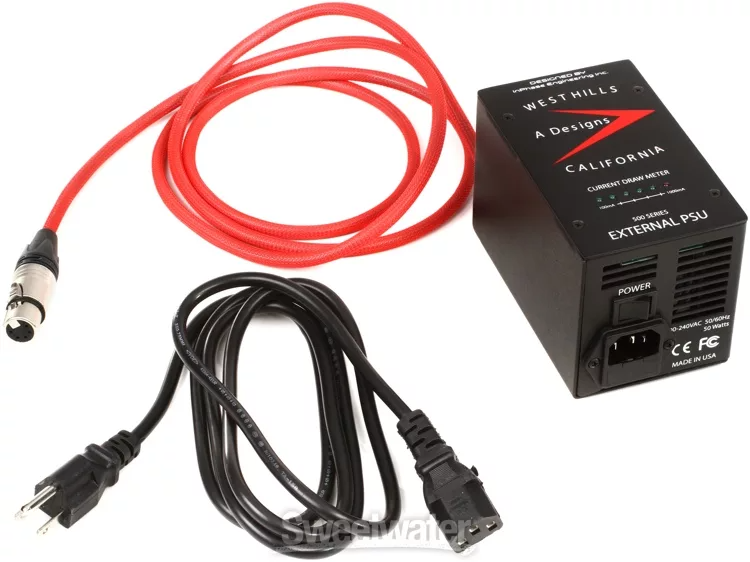



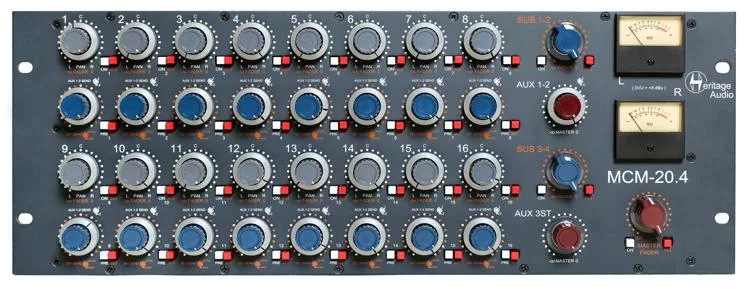




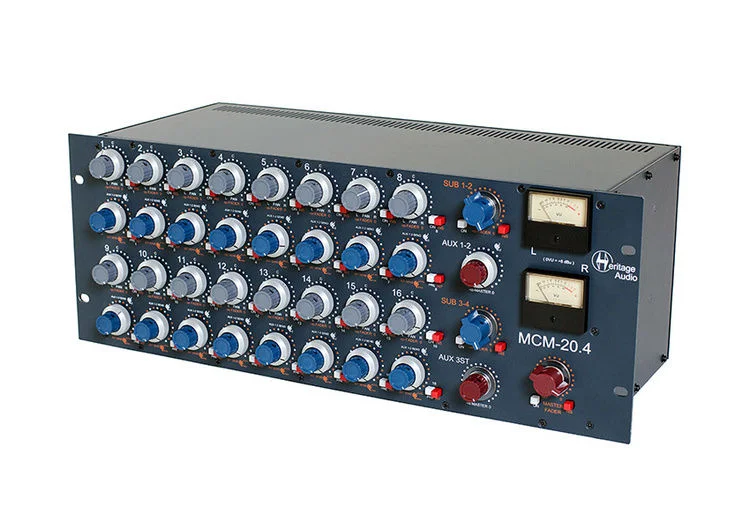
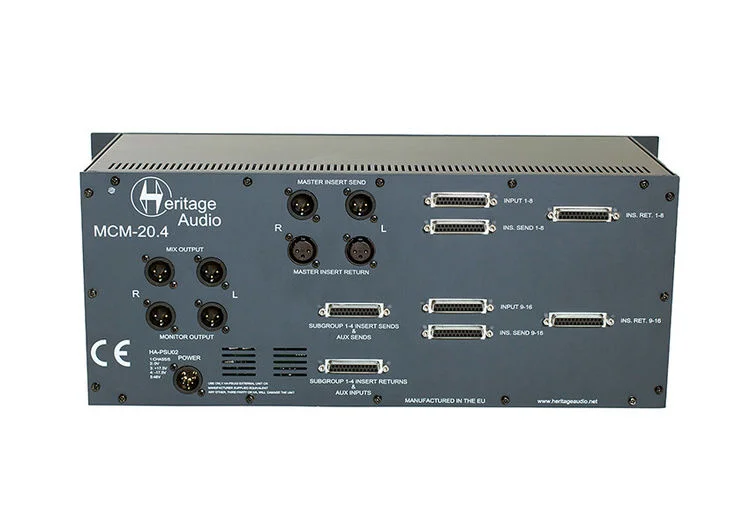
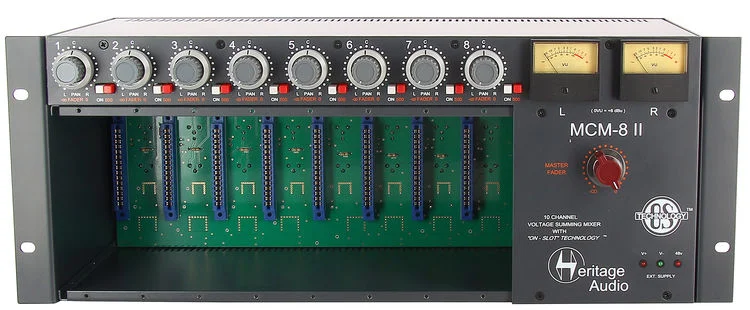

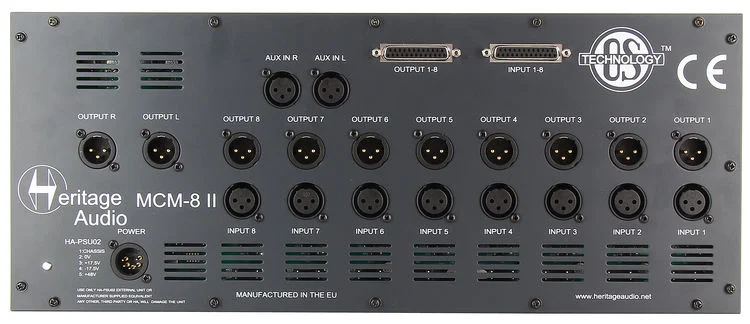


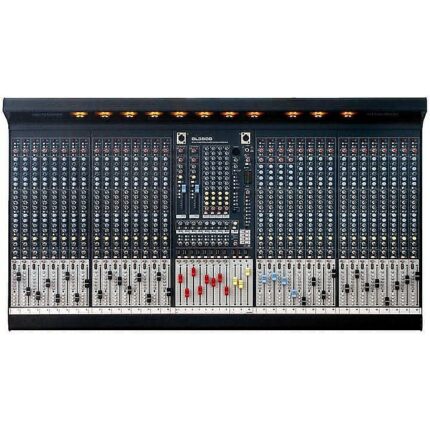
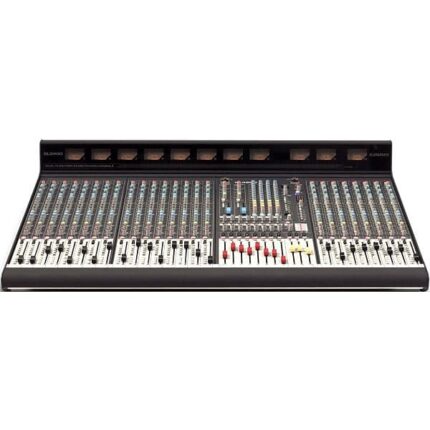

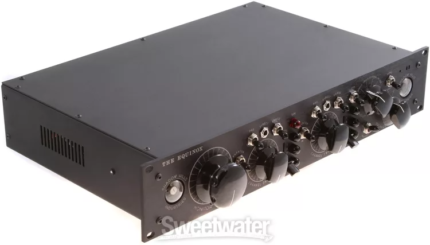





Reviews
There are no reviews yet.